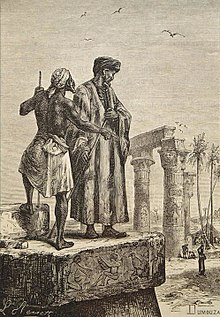Ibn Battuta | |
|---|---|
ابن بطوطة | |
 1878 illustration by Léon Benett showing Ibn Battuta (center) and his guide (left) in Egypt | |
| Born | 24 February 1304 |
| Died | 1369 (aged 64–65) |
| Other names |
|
| Occupation(s) | Traveller, Geographer, explorer, scholar, judge |
| Era | Post-classical history |
| Notable work | Rihla |
| Arabic name | |
| Personal (Ism) | Shams al-Dīn |
| Patronymic (Nasab) | Muḥammad ibn ʿAbd Allāh ibn Muḥammad ibn Ibrāhīm ibn Muḥammad ibn Yūsuf |
| Teknonymic (Kunya) | ʾAbū ʿAbd Allāh |
| Epithet (Laqab) | ibn Baṭṭūṭah |
Abū Abd Allāh Muḥammad ibn Abd Allāh Al-Lawātī (24 February 1304 – 1368/1369),[a] commonly known as Ibn Battuta (/ˌɪbən bætˈtuːtɑː/), was a Maghrebi traveller, explorer and scholar.[7] Over a period of thirty years from 1325 to 1354, Ibn Battuta visited most of North Africa, the Middle East, East Africa, Central Asia, South Asia, Southeast Asia, China, the Iberian Peninsula, and West Africa. Near the end of his life, he dictated an account of his journeys, titled A Gift to Those Who Contemplate the Wonders of Cities and the Marvels of Travelling, but commonly known as The Rihla.
Ibn Battuta travelled more than any other explorer in pre-modern history, totalling around 117,000 km (73,000 mi), surpassing Zheng He with about 50,000 km (31,000 mi) and Marco Polo with 24,000 km (15,000 mi).[8][9][10] There have been doubts over the historicity of some of Ibn Battuta's travels, particularly as they reach farther East.
- ^ Norris, H. T. (1959). "Ibn Baṭṭūṭah's Andalusian Journey". The Geographical Journal. 125 (2): 185–196. doi:10.2307/1790500. ISSN 0016-7398. JSTOR 1790500. Archived from the original on 7 December 2022. Retrieved 7 December 2022.
- ^ Roynard, Romy (22 November 2018). "Sur les traces d'Ibn Battuta : le Maroc". National Geographic (in French). Archived from the original on 7 December 2022. Retrieved 7 December 2022.
- ^ Meri, Yousef (2 July 2019). "Ibn Baṭṭūṭa". obo. Archived from the original on 1 July 2022. Retrieved 20 June 2022.
- ^ Paul Starkey (2013). "Ibn Battuta". In Ian Richard Netton (ed.). Encyclopaedia of Islam. Routledge. p. 253. ISBN 978-1-135-17960-1. Archived from the original on 2 January 2023. Retrieved 27 November 2022.
- ^ Pryor, John H. (3 April 2013). "The adventures of Ibn Battuta: a Muslim traveller of the 14th century (review)". Parergon. 10 (2): 252–253. doi:10.1353/pgn.1992.0050. ISSN 1832-8334. S2CID 144835824. Archived from the original on 6 July 2022. Retrieved 20 June 2022.
- ^ Chism, Christine (2013). "Between Islam and Christendom: Ibn Battuta's Travels in Asia Minor and the North". Cosmopolitanism and the Middle Ages. New York: Palgrave Macmillan US. pp. 59–78. doi:10.1057/9781137045096_4. ISBN 978-1-349-34108-5.
- ^ [3][4][5][6]
- ^ Parker, John (2004), "Marco Polo", The World Book Encyclopedia, vol. 15 (illustrated ed.), United States: World Book, Inc., ISBN 978-0-7166-0104-3
- ^ Dunn 2005, p. 20.
- ^ Nehru, Jawaharlal (1989). Glimpses of World History. Oxford University Press. p. 752. ISBN 978-0-19-561323-0. After outlining the extensive route of Ibn Battuta's Journey, Nehru notes: "This is a record of travel which is rare enough today with our many conveniences. ... In any event, Ibn Battuta must be amongst the great travellers of all time."
Cite error: There are <ref group=lower-alpha> tags or {{efn}} templates on this page, but the references will not show without a {{reflist|group=lower-alpha}} template or {{notelist}} template (see the help page).